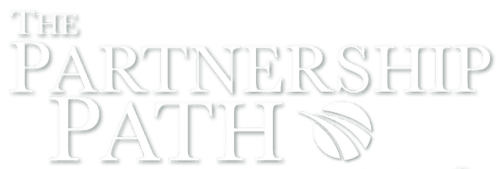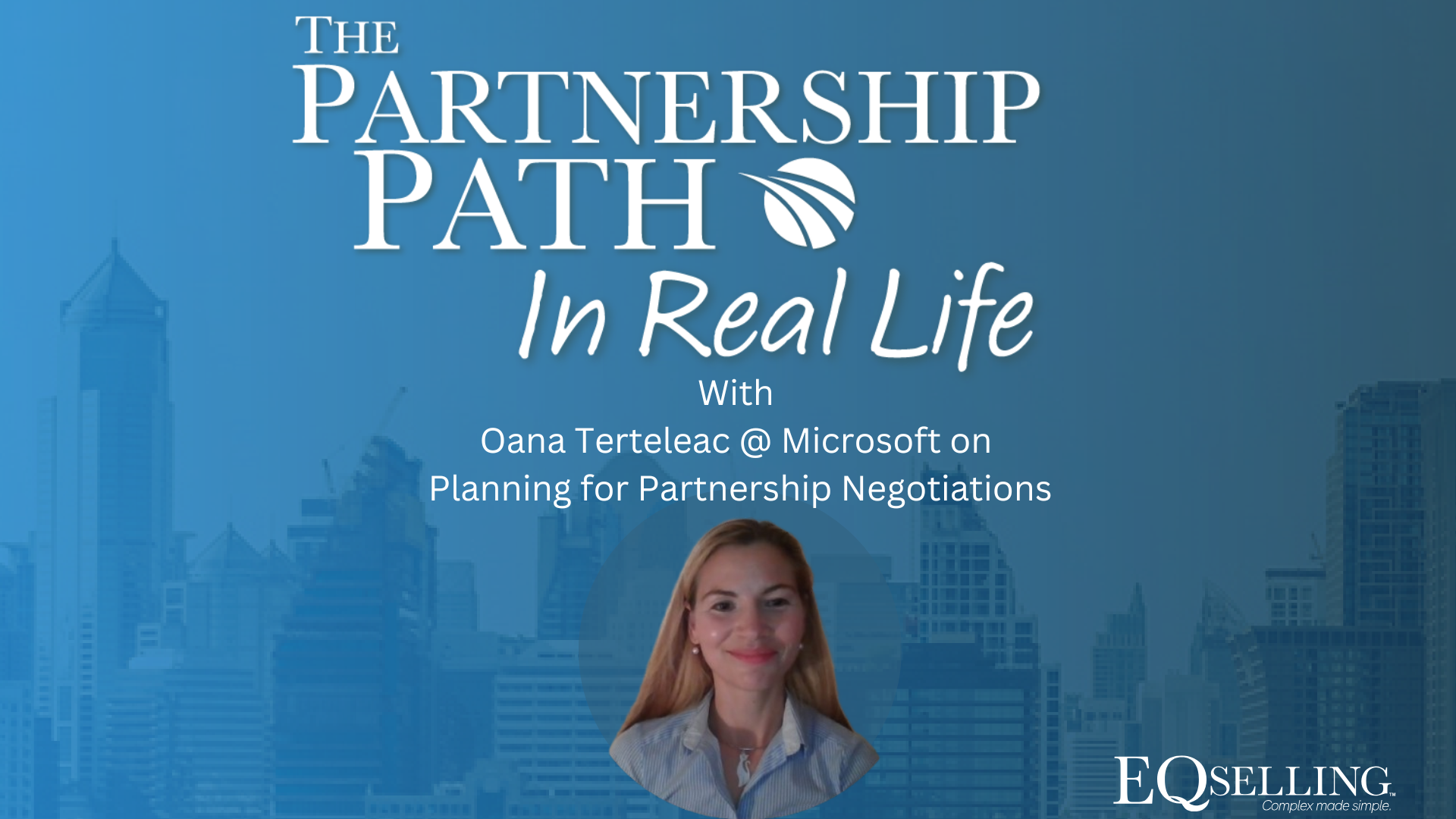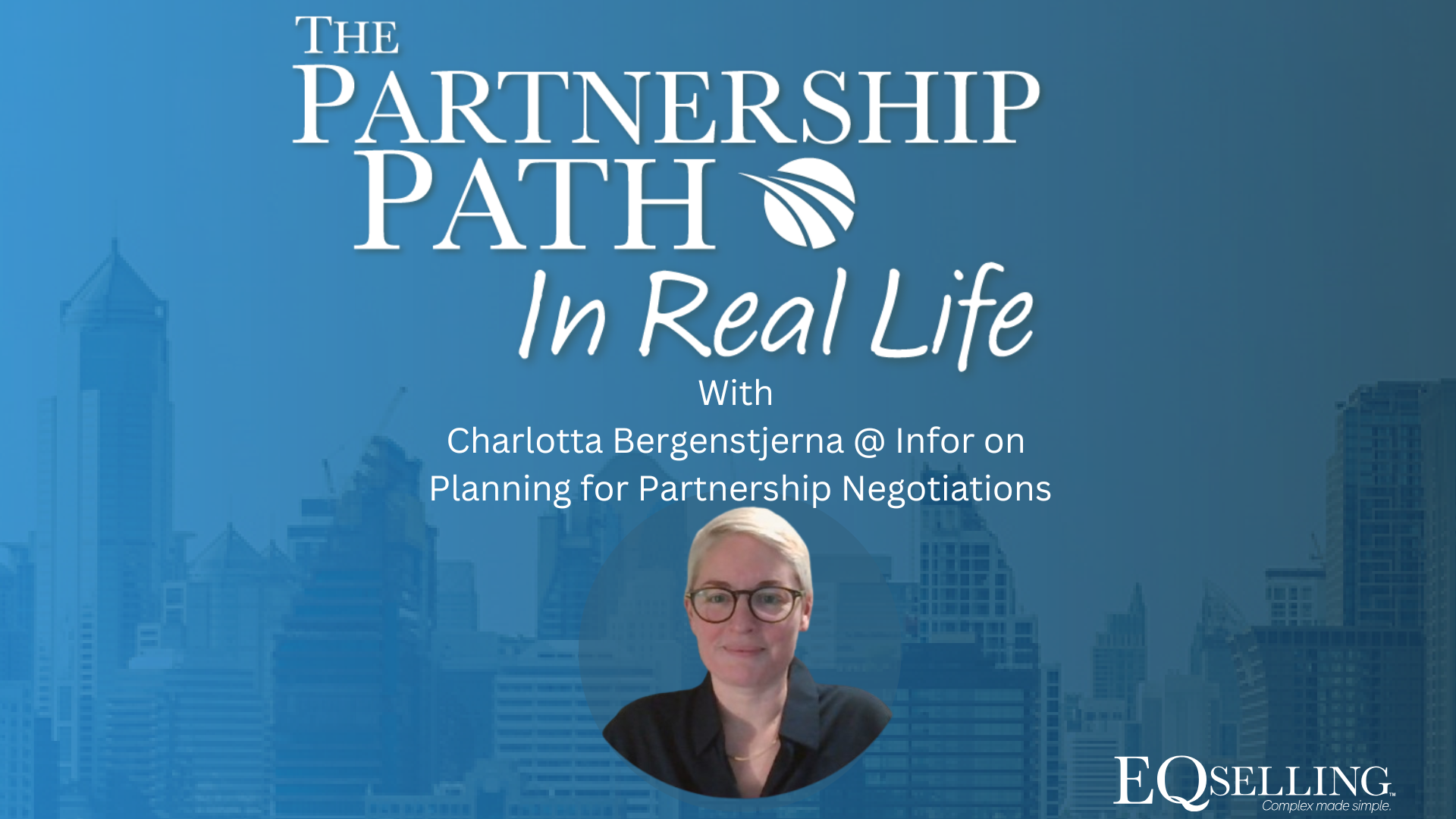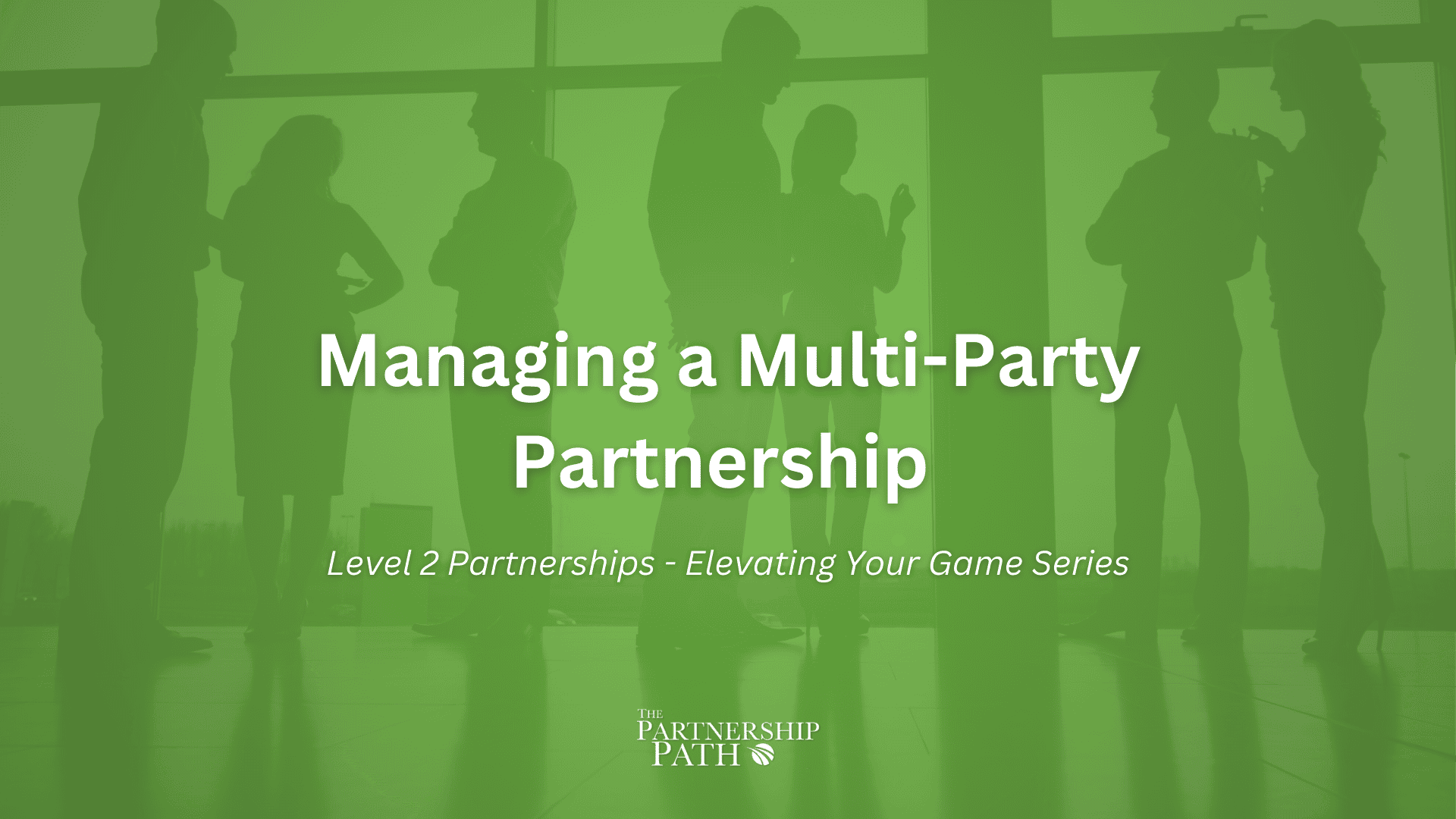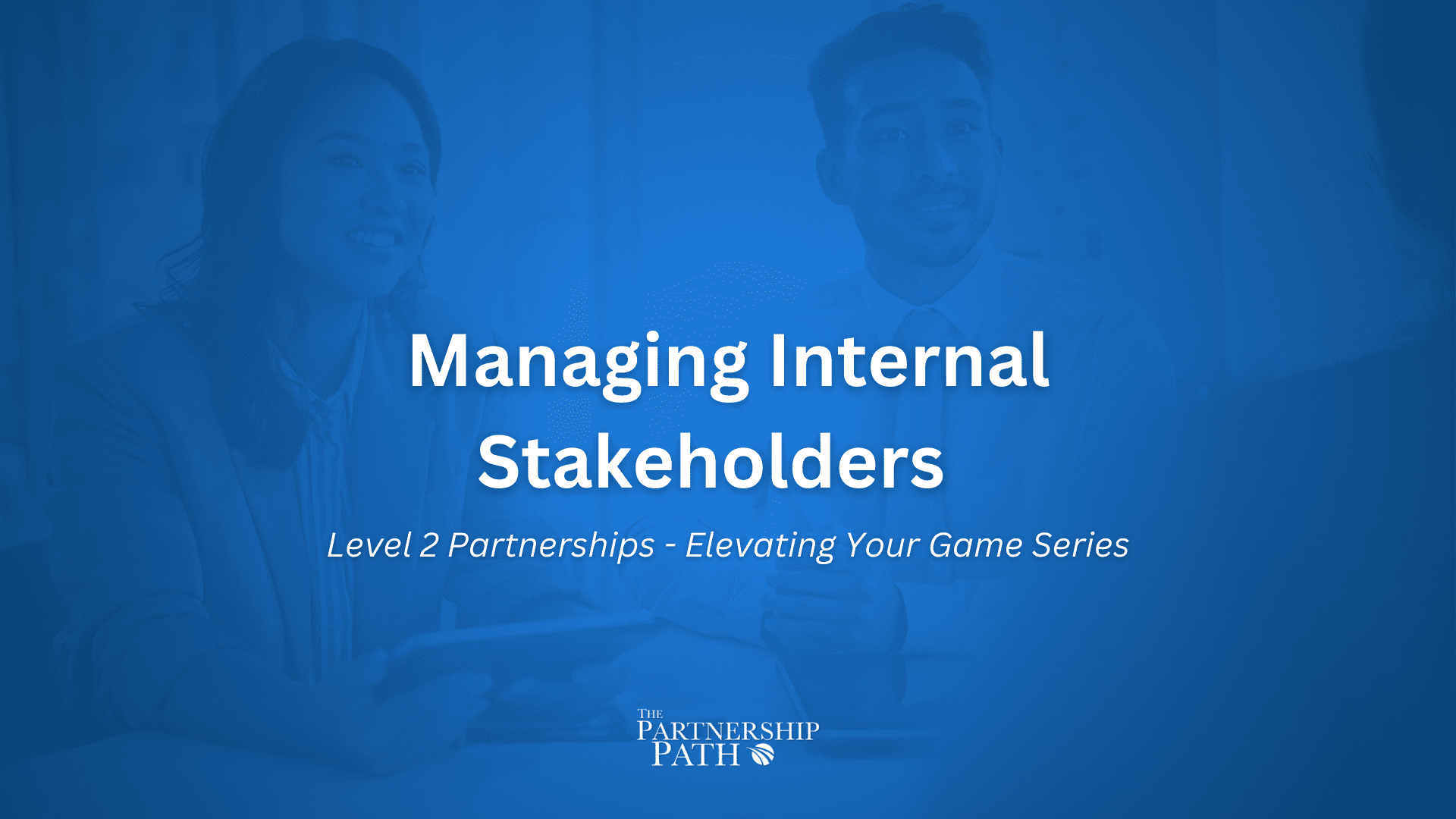Main Episode
Planning for Partnership Negotiations
Episode Summary
In this enlightening discussion during this episode of “The Partnership Path”, John Rudow and Toni Kent dive into the intricacies of planning for successful partnership negotiations.
Drawing parallels between vacation planning and strategic collaboration, they emphasize the importance of understanding expectations, aligning on goals, and being prepared for the unexpected.
This conversation is a treasure trove for anyone involved in partnerships—whether in business or personal endeavors—offering practical tips to ensure your next partnership meeting doesn’t leave anyone feeling like they missed the mark.
Transcript
John (00:01)
Well, hello, Toni. Welcome to another episode of the Partnership Path. I’m excited to have another chance to talk with you.
Toni (00:10)
Yes, let’s do it John. Yeah.
John (00:12)
Yeah, yeah, I,
one of the things I was thinking about is as we were coming into this episode today, I’m planning some vacationing, some winter vacationing with friends. We’re going skiing and it’s, we have all the, know, several couples that we go on these trips together with. And I’ve learned over the years that I have to really think about like what they are expecting out of this trip. Cause it’s not always what I’m expecting.
Toni (00:23)
Mm-hmm.
Yeah.
John (00:41)
expecting and like have you ever been on a vacation where you’re with people and they’re like, yeah This is not what I was hoping to do. Like I was planning on doing something totally different or whatever so
Toni (00:43)
I’m wondering where this is going.
definitely. Been on those where we’ve
said we’re not going on that holiday again. Yeah, yeah, yeah.
John (00:58)
Yeah,
yeah. And it’s weird, right? Because it’s one of those simple things where you’re like, well, we’re going to go skiing or whatever. so everyone wants to ski. But that’s not always the case. It’s not always as obvious as you think. So anyway, that’s just top of mind for me. And it reminded me of our topic today. We’re going to talk about planning for partnership negotiations. And it just kind of struck me as I was thinking.
Toni (01:05)
Yes.
Yeah.
John (01:26)
planning with my wife for this trip, I was like, yeah, we’re gonna talk about that in the podcast this week. you know.
Toni (01:31)
It
was good that you just give me a flashback to when we did a shared holiday with other families where lots of the men wanted to go fishing but my husband didn’t because he doesn’t fish. And then you go, yeah, maybe we should have thought about that before. should have set everyone’s expectations on what the break was going to contain. yeah, it is true. You need to think about these things.
John (01:50)
Yeah.
Well, and it certainly applies to, you know, that kind of annual planning cycle that people seem to go through with their partnerships, right? Which is, hey, how do we kind of sit down and plan out the next year or the next couple of years or whatever? I think people have a tendency to do what you and I do when we go on these vacations sometimes, that they don’t
Toni (02:02)
Mm-hmm. Yeah.
Yep.
John (02:18)
necessarily think through some of those nuances of what could impact our plan and am I making assumptions about what the other party actually wants out of this that may or may not be accurate. You remember those days?
Toni (02:32)
Mm-hmm.
It’s a good shout actually. Yeah.
Well, and I’m, you sort of made me think about, and I know we were going to look at this as, you know, kind of what’s your plan going into these kind of meetings. And actually, like if someone has said to me, do you want to come on this holiday? go, yeah, great. Cause you arranged it. You’ve taken away all the admin. Brilliant. But then if I’ve not voiced up front, well, what I like on holiday is to do X, Y, and Z.
John (02:53)
Right.
Yeah.
Toni (03:02)
When I then get there and none of those things are happening, I’m going to be disappointed. So yeah, makes sense. Yep.
John (03:06)
Right? Yeah. Yeah, totally true. And I think
from a partnership perspective, I think the way I want to structure our little talk today is to kind of break it down into sort of big picture, long term strategic parts and then more tactical parts. Right? We talk a lot. We’ve done previous episodes on strategic alignment and really kind of drawing the box around our
Toni (03:22)
Yep. Yep.
Yeah.
Yeah.
John (03:33)
partnership, like what are the boundaries of our partnership? What are we going after together? Who’s the customer and all that. And then there’s more tactical stuff, which we in our stuff we call tactical alignment, which is really about the next fiscal cycle. But I think one of the things I think we need to get good at as partner professionals is always going back to that boundaries conversation and thinking about
Toni (03:37)
Mm-hmm.
Yeah.
John (04:01)
What are all the possible things that are impacting those boundaries, both from our perspective and from the partner’s perspective, that may impact how we want to plan together? Like, are we changing kind of that north star, that direction we’re heading in because of, you know, market trends or, you know, is one of us going through a merger or an acquisition or are we buying, you know, some
Toni (04:07)
Yeah.
Yeah.
Yeah.
John (04:31)
solution that’s going to impact the solution you and I have in market together? Like, does it change that dynamic or does it open up a new market for us? you know, what have we had a management change? Has there been senior executives that have left either one of our organizations that might sort of change how we think about the partnership? And be prepared for those conversations. I’m not sure that
Toni (04:36)
Yeah.
Yeah.
John (04:57)
I know I don’t spend enough time thinking about that stuff in preparation for that annual planning. so I’d be willing to bet a lot of people don’t as well.
Toni (05:09)
Yeah. And you kind of made me think about sort of reflecting on some of those planning meetings that you might have with partners and often, and I don’t know, maybe it’s UK thing, but people being, you know, very polite. So you do the niceties and then you go around the table and you do your introductions and then you kind of start with the things that are happening today. And there were two experiences I had, and I think.
So one was with Dell and I think one might’ve been with AWS. And I think it happens more often now is that you kind of start with the big ask. You don’t kind of, you know, cause you spend the whole meeting waiting for this strategic thing that you wanted to talk about. Well, why don’t you make your strategic planning meeting about what are the key factors that could influence our North Star? What are the changes? What’s happening in my respective businesses?
John (05:44)
Right.
Yeah.
Yeah. Well, and I think sometimes too, don’t always have the right people in the room for that conversation. Right? So we come to our annual planning meeting and we’re meeting with our counterpart instead of the executives. And our counterparts doesn’t know the answer to some of those questions either, right? Where they’re like, yeah, you’re right. I don’t know if we’re buying somebody or not buying somebody or changing. And so even throwing that
Toni (06:11)
Yeah.
you
Hmm.
John (06:32)
strategic ask, those big asks up to the front, may or may not get us what we want if the right people aren’t in the room. So I think that’s the other thing I think we have to think about is, okay, wait, do we have the right people come in to have that kind of a conversation about the boundaries of our partnership?
Toni (06:36)
Hmm.
Yeah.
Yeah, yeah. It’s a good shout. And I was thinking about a couple of things that were said on the in real life episode. So Selena at Infor, I made a note of it here, but she’d said, you know, you have to remember that partners don’t work for you. And so that’s the sort of skill and art in, you know, how, how do you like for you, John, how do you approach that planning for the planning?
John (07:02)
Yeah. Yeah.
Yeah.
Yeah. Yeah, think, look, I think you have to, I think you have to sit down and think through what do I hope is our end result, right? Like what am I aiming for as the end result? Which is different than what do I want? You know what I mean? Like, like there’s a, you know, if I think about kind of a traditional partnership, a revenue share type of partnership, I might say, hey, look, I want to get
Toni (07:35)
Hmm, yeah, yeah.
John (07:47)
you know, X million dollars out of this partnership, right? That’s what I want or what I need. But then I have to think through, okay, what’s going on in their business and what’s happening and how important is this partnership to them and kind of adjust my thinking to think, well, so best case scenario, this is probably what what we’ll end up at or, you know, so I need to I need to prepare my talk about, hey, I got to make sure I can at least get to that to that.
Toni (07:51)
Yeah.
Mm.
John (08:15)
like what I think is realistic versus what I want. Now, sometimes the realistic is bigger than what I want. Not very often, but it can happen. And so I think there’s just a lot of preparation of being super clear about what you want and what you’re willing to give away to get it. Like, what are you willing to invest and do in order to get it? And then to really think carefully about what you think the partner
Toni (08:23)
Hmm.
Mm.
Yeah.
Yeah.
John (08:44)
would potentially come back with? Like, how are they going to respond to that? And am I prepared for that? Like, I just don’t want to ever be surprised in that conversation. Which typically means I’m doing a lot of work in advance of asking a lot of questions long before I get there.
Toni (08:49)
Hmm.
Yeah.
And that was kind of where I was going to head next was to what extent do you feel that you should be looking outside of, so let’s say, you know, you’re working with a partner who has relationships with other vendors, organizations, you know, should you be looking at, well, what are the gives and gets that are happening there? What are they typically doing with their channel partners? You know, doing that kind of work.
John (09:28)
For sure, that’s part of it. And in fact, I think we have planned this season an episode very specifically on that kind of competitive mind share concept. And so we’ll talk in detail about that in that episode. But absolutely part of my planning needs to be, what do I think they’re comparing this to? Like, you know, who else is at the table potentially offering or asking or demanding or
Toni (09:37)
Yeah.
Yeah.
John (09:58)
You know, and, you know, we talk a lot in the sales world about one of your best differentiators isn’t the solution you bring to the table or the partnership you bring to the table. It’s how you partner. And so your ability to come to the table better prepared with a better sense of empathy of what they’re going through and how your partnership can impact their business, the more likely they are to take your offer.
Toni (09:58)
Yeah.
Yeah.
Hmm.
Mm.
John (10:27)
over somebody else’s offer who didn’t put in that homework. You know what I mean? Like, it doesn’t even have to be the best offer, but because they like the way you do business, you have a leg up.
Toni (10:30)
Yeah.
Yeah, and that was something that came up in one of the in real lives talking about that empathy with partners at Stephanie saying to be able to demonstrate that will take you a long, long way. Yeah.
John (10:48)
Yeah!
Yeah.
Yeah, Stephanie was one of those that just really hammered that home, right, about really being able to put yourself in their shoes and understand kind of what they’re thinking and what matters to them. Super good partnering technique, super good selling technique, super important in this kind of a discussion in preparing. Now, the funny things, we talked about this kind of strategic level and…
Toni (11:04)
Yeah.
Yeah.
John (11:21)
Before we go too long on this episode, I just want to also talk a little bit about that tactical side. Although the fundamentals are the same, right? Which is, what do I want to get out of this partnership in the short term? What do I think is reasonable? What do I think the partner is going to respond to? And this is, think, a little bit easier to prepare for because it’s a little easier to get that data of what is the partner trying to do in their business in the next year?
Toni (11:24)
Yeah.
Hmm.
John (11:51)
These are a little bit less esoteric types of questions than some of those bigger strategic ones. But it’s really about, you know, what are their business priorities? Are they emphasizing a particular solution or market set or a market segment or customer profile in the next year that really matters to them? And can we find a way in? I always go back to
Toni (11:54)
Yeah.
Yeah.
John (12:19)
Since you were at Microsoft, I’ll use this example that we used to write these job descriptions for Microsoft of, look, here’s kind of a role framework for what that looks like. And they would always, every year they would want to change the job description based on the fiscal priorities. And I would always say, no, the job doesn’t change, but yeah, the emphasis does. And I think that’s kind of what we’re talking about here. The partnership itself doesn’t have to change.
Toni (12:37)
No. Yeah.
Yeah. Yeah.
John (12:48)
but the emphasis might change one year to the next. Like where are we gonna put our resources short term and where does that work for me and my priorities based on what I’ve been able to learn about the partners priorities.
Toni (12:49)
No.
Hmm. And I think one thing that has come up recently in a conversation with a distributor and actually one of the best things that they can offer is a credit line. And I think sometimes when you’re caught up in the day-to-day business of working in a partnership, thinking about what, what could I bring to the table? If I set aside the technology or the solution, whatever, what other tools could I present?
John (13:25)
Yeah.
Toni (13:31)
that from a commercial perspective or a technical perspective could help with a real business challenge. so I think it is being alert to all of the things that are at your disposal to help in those, you know, tactical planning meetings as well is really important.
John (13:38)
That’s right.
Yeah, some of which are highly tangible, like what you described with the distributor with a line of credit type of offering and some which are very intangible, which is, hey, you know, we’ve got expertise in a particular area that you’re trying to grow your business in that’s not really related to our partnership, but I can get you access to that expertise as an outside, you know, to kind of help your business. yeah, super, super good point. Well,
Toni (13:52)
Mmm.
Mm.
Yeah.
John (14:18)
Look, one of the things, this is gonna be a really interesting episode, because I think the way people prepare for negotiations is highly personal and highly, like I think a lot of people have a lot of different sort of techniques they’ve kind of worked out over the years on how to make this work. And so I’m super anxious to hear from the community in our In Real Life episodes about what they’re doing to make this work. How do they prepare for those negotiations and how transparent are they?
This is one of the other things I kind of want to know is like, how much of that do they share with the partner in terms of, I did this research and here’s what I learned versus kind of just keeping that knowledge to yourself. But you know what I mean? Like I think there’s a technique in there that different people will do different ways.
Toni (15:02)
Yeah!
It’s a good shout as well, because sometimes it’s better to just say than ask a leading question. Like, I hear that maybe such and such might be thinking this way. You might be better to say, look, I’ve heard that your CTO has applied for another job.
John (15:20)
Yeah. Yeah.
Yeah,
here’s what the rumor mill is saying. Do we need to think about that? Yeah. Very cool.
Toni (15:28)
Hmm.
Yeah, yeah, yeah. So
I’m glad that you touched on that because it was a question I had, guess, kind of that, yeah, to what extent are you upfront about, you know, this is what I need from this, or this is what I hope for. So, yeah. Yeah.
John (15:42)
Right. Right.
Yeah. Well,
we’ll see what the community has to say. Thanks, Toni. Another good time with you. Look forward to our next one.
Toni (15:49)
Yeah, yeah. Okay, thanks, John.
Thank you, bye.
Key Takeaways
- Set Clear Expectations: Just as on a vacation, understanding what each party desires from a partnership is crucial to avoid disappointment.
- Know Your Partner’s Landscape: Research and understand the external factors affecting your partner’s business to craft relevant strategies.
- Embrace Empathy: Harnessing empathy in negotiations can distinguish your approach, fostering stronger, more productive relationships.
